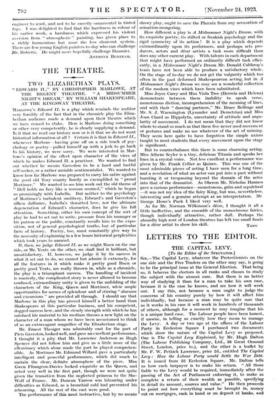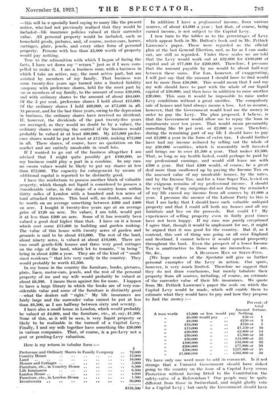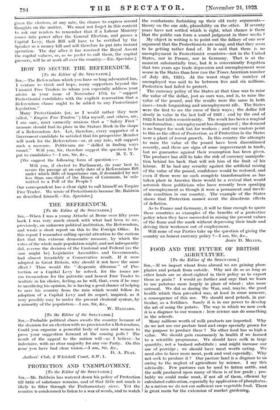LETTERS TO THE EDITOR.
THE CAPITAL LEVY.
[To the Editor of the SPECTATOR.] Sin,—The Capital Levy, whatever the Protectionists on the one side and the Free Traders on the other may say, is going to be the principal issue at the General Election. That being so, it behoves the electors in all ranks and classes to study the subject with the utmost care. But there is no better way of studying it than for a man to take his own case, because it is the case he knows, and see how it will work out. I say this, not because a man ought to judge the concerns of his country purely by how it will affect him individually, but because a man may be quite sure that as it works in his case it will work in hundreds of thousands of others, although for a moment he may imagine that his is a unique hard case. The Labour people have been honest, if unwise, in telling us exactly how they mean to manage the Levy. A day or two ago at the offices of the Labour Party in Eccleston Square I purchased two documents which show the nature of the Capital Levy as proposed. One is The Capital Levy Explained, by Mr. Hugh Dalton (The Labour Publishing Company, Ltd., 38 Great Ormond Street, London, price 1s.), and the other is a leaflet by Mr. F. W. Pethick Lawrence, price 2d., entitled The Capital Levy : How the Labour Party would Settle the War Debt. It is issued from 33 Eccleston Square. Mr. Dalton tells us how each taxpayer is to make his return. " All those liable to the Levy would be required, immediately after the passing of the Act of Parliament enforcing it, to make as complete a return of their wealth as possible, specifying in detail its amount, sources and value." He then proceeds to point out how everything must be brought in, money out on mortgages, cash in hand or on deposit at banks. and
-this will be a specially hard saying to many like the present writer, who had not previously realized that they would be included-life insurance policies valued at their surrender value. All personal property would be included, such as household goods, pictures, and, of course, motor-cars, horses, carriages, plate, jewels, and every other form of personal property. Persons with less than £5,000 worth of property would pay nothing.
True to the admonition with which I began of facing the facts, I have set down my " return " just as if I were com- pelled to make it. I am a business man, with a business in which I take an active, nay, the most active part, but am assisted by members of my family. That business was some twenty-five years ago turned into a limited liability 2ompany with preference shares, held for the most part by me or members of my family, to the amount of some £30,000, and with ordinary shares to the amount of about £64,000. Of the 5 per cent. preference shares I hold about £15,000. Of the ordinary shares I hold £60,000, or £75,000 in all. At present, and for the last three years, owing to the depression in business, the ordinary shares have received no dividend. If, however, the dividends of the past twenty-five years are averaged, as they would no doubt be by a valuer, the ordinary shares carrying the control of the business would probably be valued at at least £60,000. My £15,000 prefer- ence shares would be put at least at £12,000, making £72,000 in all. These shares, of course, have no quotation on the market and are entirely unsaleable in small lots.
If I wanted to go out of the business altogether I am advised that I might quite possibly get £100,000, as my business could play a part in a combine. In any case no sworn valuer would be likely to put my shares at less than £72,000. The capacity for enlargement by means of additional capital is reported to be distinctly good.
I have the misfortune to possess another block of valuable property, which though not liquid is considered to possess a considerable value, in the shape of a country house within thirty miles of London with a hundred and ten acres of land attached thereto. This land will, no doubt, some day be worth on an average something between £200 and £400 an acre. I bought it twenty-five years ago at an average price of £120 an acre. No valuer, I am told, would put it at less than £200 an acre. Some of it has recently been valued a good deal higher than that. I have on it a house which cost some £15,000 in building and garden making. The value of this house with twenty acres of garden and grounds is said to be about £15,000. The rest of the land, about ninety acres, is valued at about £16,000. There are two small gentle-folk houses and three very good cottages on the edge of the land, which let to tenants, " in being " bring in about £200 a year. They are of the kind of " small- sized residence " that lets very easily in the country. They would probably be worth £5,500.
In house in the country the furniture, books, pictures, plate, linen, motor-cars, jewels, and the rest of the personal property of me and my wife would probably be valued at about £6,500. I insure them against fire for more. I happen to have a large library in which the books are of very con- siderable value and some of the furniture is distinctly good -what the dealers call " right." My life insurances are fairly large and the surrender value cannot be put at less than £6,500, as I am halfway between sixty and seventy.
I have also a small house in London, which would probably be valued at £4,000, and the furniture, etc., at, say, £1,500. None of this, as it will be seen, is very liquid property or likely to be realizable in the turmoil of a Capital Levy. Finally, I and my wife together have something like £30,000 in various companies. That, of course, is a pre-Levy not a post or pending-Levy valuation.
Here is my return in tabular form :-
Preference and Ordinary Shares in Family Company Country House
• •
Houses and Cottages • •
• •
Furniture, etc., in Country House Life Insurances ..
• •
London House .. • • Furniture, etc., in London House
• • • •
Investments .. • •
72,000 15,000 16,000 5,000 6,500 6,500 4.000 1,500 30,000 /156.500
In addition I have a professional income, from various sources, of about £4,000 a year ; but that, of course, being earned income, is not subject to the Capital Levy.
I now turn to the tables as to the percentages of Levy
which appear both in Mr. Dalton's book and in Mr. Pethick Lawrence's paper. These were regarded as the official plan at the last General Election, and, as far as I can make out, are still so regarded. Under these scales we are told that the Levy would work out at £32,800 for £100,000 oh capital and at £77,800 for £200,000. Therefore, I presume that the amount payable by me would be about half-way between these sums. For fear, however, of exaggerating, I will just say that the amount I should have to find would not be more than £50,000. This would mean that I and my my wife should have to part with the whole of our liquid capital of £30,000, and then have in addition to raise another £20,000. This sum it would be impossible to raise under Levy conditions without a great sacrifice. The compulsory sale of houses and land always means a loss. Let us assume, however, that the Government would lend me the money in order to pay the Levy. The plan proposed, I believe, is that the Government would allow me to repay the loan in instalments over ten years. That would mean presumably something like 10 per cent. or £2,000 a year. Therefore, during the remaining part of my life I should have to pay out £2,000 a year in the form of extra tax. I should further have had my income reduced by selling out the whole of my £30,000 securities, which is reasonably well invested and brings me in over £1,500 a year. That makes £3,500. That, as long as my health lasted, could perhaps be paid by my professional earnings, and would still leave me with £500 a year. But that £500 would, of course, be a great deal more than swallowed up by paying the Income Tax on the assessed value of my unsaleable houses, by the rates, and by the Income Tax, and for a time Super Tax, levied on the exiguous remains of my professional income. I should be very lucky if my outgoings (lid not during the remainder of my life exceed my income from all sources by £1,000 a year. I presume the answer of the Labour Party to this is that I am lucky that I should have such valuable unliquid property and that I could sell both my houses and all my furniture and live on the proceeds. But could I ? My experiences of selling property even in fairly good times have not been happy. If my case was purely exceptional I agree that, though it would be unpleasant for me, it might be argued that it was good for the country. But if, as I contend, this sort of thing was going on all over England and Scotland, I cannot believe it would spread prosperity throughout the land. Even the prospect of a lower Income Tax is unattractive to those who are incomeless.-1 am,
Sir, &c., A BUSINESS MAN OF SIXTY-FIVE.
[We hope readers of the Spectator will give us further
personal examples of the Levy in action. Our space, however, is very much limited. Therefore we suggest that they do not draw conclusions, but merely tabulate their property from all sources, including, of course, an estimate of the surrender value of their life insurances. We quote from Mr. Pethick Lawrence's paper the scale on which the Capital Levy would be made, which will enable them to estimate what they would have to pay and how they propose to find the money :- Per cent. of
Amount fortune.
total A man worth
£5,000 or less would pay Nothing.
£6,000 would pay .. £50 or 1
L8,000 •• t250 or
3
£l0,000 •• £550 or
5
£15,000 P/
£
• • £1,550 or 10 £20,000 PI • • £2,800 or
14
PI
L30,000
• • £5,800 or
19
PI
£50,000
£12,800 or
25
£100,000 91 • • 132,800 or
83
£200,000
• • £77,800 or
89
£500,600
.. £227,800 or 45
£1,000,000 £502,800 or 50
We have only one word more to add in comment. Is it not strange that a Unionist Government should have, risked going to the country on the issue of a Capital Levy versus
Protection without having fitted to the Constitution the
safety-valve of a Referendum ? Our people may be quite different from those in Switzerland, and might gladly vote for a Capital Levy ; but surely the Government should have
given the electors, at any rate, the chance to express second thoughts on the matter. We must not forget in this context to ask our readers to remember that if a Labour Ministry comes into power after the General Election, and passes a Capital Levy, their Bill will have to be certified by the Speaker as a money bill and will therefore be put into instant operation. The day after it has received the Royal Assent the capital valuers, or, as we prefer to call them, the capital guessers, will be at work all over the country.—En. Spectator.]




















































 Previous page
Previous page